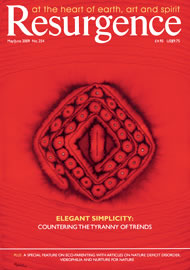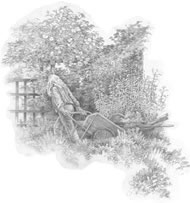AT A TIME when so much culture seems trendy, shallow and prescriptive, it is a great joy to discover a book that takes us deeper into our lives and the Earth. Gardening at the Dragon’s Gate by Wendy Johnson, a Buddhist meditation teacher and co-founder of the organic Farm and Garden programme at Green Gulch Farm Zen Center, is a profoundly nourishing and useful book.
It is a love song to the very specific and extraordinary garden at Green Gulch, a prose poem of gratitude to Johnson’s gardening teachers, Harry Roberts and Alan Chadwick, “both of them raw and ragged prophets”, and an invitation to gardeners and seekers to cultivate the mind as well as the field. True to its intention the material moves gracefully from contemporary garden practice to old plant lore to Zen stories.
The book is rich with information about soil, pruning roses, dividing iris, endangered farmlands, educating children about food, and dealing with weeds and pests. Johnson has much to teach about the craft of gardening and generously shares her failures as well as her enthusiasms.
Yet her vision is much bigger than the topics she covers. Unlike so many practical souls, she is not only conveying information thoroughly but also asking us to think deeply about wildness and cultivation on many levels. She illuminates the relationship between inner nature and outer Nature directly and subtly. The practice of gardening informs her Buddhism, and the practice of Zen enlivens her gardening. Johnson is as comfortable talking about the breath of the land as she is giving recipes for worm and microbial teas to feed the soil.
At one point she writes, “Some days I walk really slowly, especially when I know there is a lot of work to be done.” In that statement Johnson gently challenges our “hurry sickness” and reminds us of one of time’s great paradoxes. Relaxing into the moment opens up time and space, allowing us to accomplish our tasks with more skill and ease.
The word ‘grounded’, used to describe someone who is serious and rooted, not spacey or scattered, has become a cliché, and yet it is a necessary term when so many of us live ‘in our heads’ and cut off from the land. It is certainly an accurate description of the archetypal gardener. Johnson’s view, while unquestionably grounded in place and time, also includes the poetic and historic. As her teacher Alan Chadwick said, “When you cultivate the earth you are opening the ground to starlight.”
Johnson loves words for the seed wisdom in their roots. Turning the words over and hearing “their deep, old roots and connections”, she celebrates how humus, which means ‘earth’, ‘ground’, or ‘soil’ in Latin, finds its way into our human experience in words like ‘humble’, ‘humiliating’, ‘humorous’. She notes, “The word ‘cultivate’ comes from the Latin colere, to culture, to worship, to respect, to till, and to take care of, from the still older root kwel, which means to revolve around a center… When a gardener picks up a tool and begins to cultivate the ground, the wheel of life continues to turn.”
Johnson, passionate and compassionate, fierce and tender, insists on being a real person, not some stereotype of a perfectly calm meditation teacher. “I am a mad gardener. I mutter and rant, and at night I shake dry seeds out of my unruly mane of hair. The garden is in my bones, in my gut. And although I am a civil person, I am at my best when left completely alone at nightfall to spread the last wheelbarrow of aged horse manure around the base of the budded-out black currant plants from England.”
Gardening at the Dragon’s Gate is filled with beautiful passages that cry out to be underlined, shared with friends, reread. It is a book to live with and travel with, to read inside by the fire and out under your favourite oak tree, to savour early in the morning before you go to work in your garden, and at the end of the day as you dream over what to plant next season.
J. Ruth Gendler is the author of Notes on the Need for Beauty, The Book of Qualities and Changing Light.








